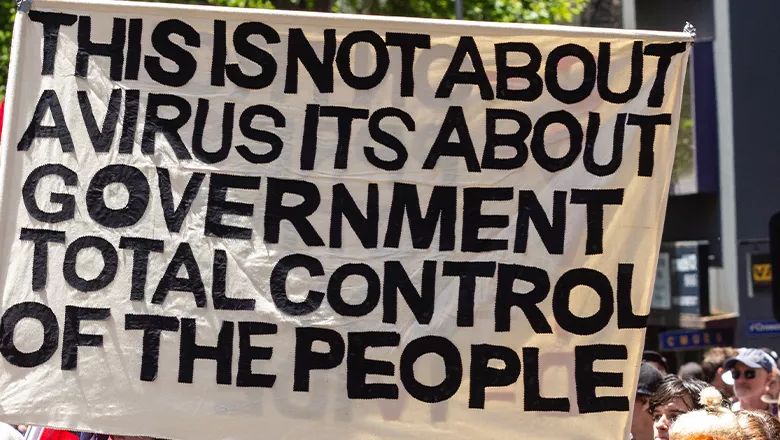The idea that the United Nations or a global community was impacted in the same way at the same time, which was actually the core message of the pandemic at the time, was very quickly dismantled because we quickly realized that there were power dynamics between states, and within states, that meant that…some lives were worth much more than the lives of others.
Professor ‘Funmi Olonisakin
07 October 2022
The ongoing political consequences of the pandemic
A new podcast episode looks at the huge political consequences of the COVID-19 pandemic and how its effects are still being felt at every level around the world today.

The WORLD: we got this podcast returns for a fourth season with a new episode looking at the political consequences from the pandemic and lessons we need to learn for handling future crises.
Featuring academics from the Faculty of Social Science & Public Policy, the episode explores how the pandemic affected the standing of global leadership organisations, and challenged previously held ideas about effective leaders and political systems.
It also looks at how the pandemic played a part in the downfall of the British Prime Minister and is still influencing key UK government concerns today. And the episode reveals ways in which the far-right exploited the chaos and confusion surrounding COVID-19 to recruit new followers.
Professor ‘Funmi Olonisakin, Professor of Security Leadership and Development at the African Leadership Centre and Vice President responsible for international engagement and service at Kings, outlines how the pandemic quickly exposed flaws in the global leadership infrastructure.
She said the Global North was able to develop vaccines and protect their own populations quickly but the opposite was the case in the Global South. The pandemic also challenged preconceptions that democratic states would cope more successfully than autocratic ones, as it emerged many people in democracies did not trust their leaders nor their fellow citizens.
She said a key learning from the pandemic is around the importance of the ‘software’ of leadership infrastructure − the relationships and trust between those governing and wider society – as well as the ‘hardware’ structures of governance and the state.
Looking to the future, 'Funmi wants to see a new way of thinking when it comes to global leadership and international organisations.
I do not think that we have the right organisations, the organisations that we need for this moment in history. We have been using organisations that were created in the last century to respond to the challenges of the last century.
Professor ‘Funmi Olonisakin
In the episode Professor Andrew Blick, Head of the Department of Political Economy outlines how, while exceptional emergency measures were needed, there was a lack of clarity in the UK around the new rules, restrictions and guidelines that were introduced.
An important principle of the rule of law is clarity. We're supposed to be able to know what the law is and know whether or not you're breaking the law.
Professor Andrew Blick
It also contributed to the Prime Minister during the pandemic Boris Johnson being forced out of office in part because of revelations about parties and the behaviour displayed by him, his ministers and officials in 10 Downing Street during the lockdowns.
He says it is still affecting decisions today by the new Prime Minister Liz Truss and her Cabinet, with issues such as taxes and the free market being where they are in part because we are paying for the pandemic.
The pandemic had a huge effect on global politics, on global society, on global economy and its impact will continue in ways that could be hard to predict, but we should try to learn lessons for the future...Any major event like this means that we have to respond quickly, improvise, make things up as we go along, get some things right, get some things wrong, and then hopefully, a good aspect of public policy would be that we would learn from that experience and use that experience to respond better to the next challenge.
Professor Andrew Blick
Blyth Crawford, a research fellow at the International Centre for the Study of Radicalisation (ICSR) and a PhD student in the Department of War Studies, outlines in the episode how the far-right exploited the chaos and confusion surrounding COVID-19 to recruit new followers.
Coronavirus provided this incredible opportunity where there was widespread moral panic and widespread indecision and the far right was very well equipped to deal with that. We saw these collectives on social media that had modest membership absolutely exploding in terms of membership and usership because of COVID conspiracy theories, and particularly those which are gelling with existing wellness collectives online and in parenting collectives.
Blyth Crawford
She says there are lessons to be learned from the pandemic, around how the far right finds societal disruption and political unrest useful , so it is vital we have a coherent response around other divisive issues that they could exploit in the future for their own aims.
I think a number of these far-right groups have, to some extent, moved slightly away from the importance of coronavirus and are now capitalizing on what they view as this new hot button issue, which is trans rights and so I think in an ideal world we would look at our response to the COVID pandemic and would think we don't want that to happen again.
Blyth Crawford
To find out more about Blyth Crawford and her research, visit the ICSR website.


